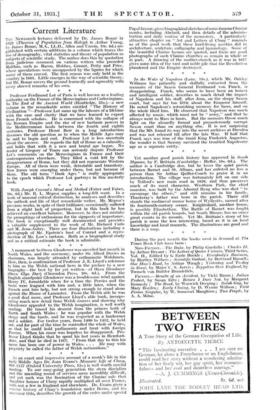In the Wake of Napoleon (Lane, 18s.), which Mr. Oakley
Williams has patiently and skilfully extracted from the memoirs of the Saxon General Ferdinand von Funek, is disappointing. Funck, who seems to have been an honest and intelligent soldier, describes in much detail the impact. of Napoleon and his staff, after Jena, on the sleepy Saxon court, but says far too little about the Emperor himself. He noted Napoleon's astonishing memory for faces, and on the whole liked him. He observed that Napoleon was much affected by music, which must not be " noisy," and that he always went to Mass in boots. But the memoirs throw much light on the absurdly formal and preposterously corrupt Saxon court than on anything else. It is not surprising that the MS. found its way into the secret archives at Dresden and was not released till after the late War. If half that Funek says was true of the timid King Frederick Augustus, the wonder is that Saxony survived the troubled Napoleonic age as a separate entity.






































 Previous page
Previous page